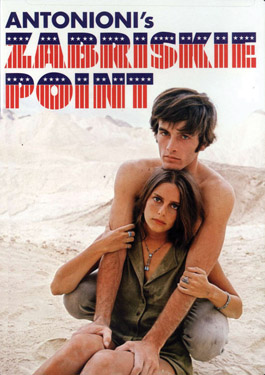home | metro silicon valley index | movies | current reviews | dvd review

Zabriskie Point
One disc; Warner Home Video; $19.97
By Michael S. Gant
With the release of Michelangelo Antonioni's notorious 1970 feature, Zabriskie Point, we may have reached the outer limits of '60s nostalgia. After Blow-Up, Antonioni set about on his second English-language film for producer Carlo Ponti, attracting attention from the feds for some nudity and antiestablishment politics. Alas, the film did not attract many viewers and fell far short of making back its $7 million budget at the box office. In typically desultory Antonioni fashion, the film follows the accidental romance of two counterculturists: Mark (Mark Frechette), a conflicted campus radical, and Daria (Daria Halprin, daughter of San Francisco audience-participation dance pioneer Anna), a hippie chick/secretary dispatched on a mission by her boss (Rod Taylor) to a desert estate near Phoenix. On the run from the police after a violent demonstration, Mark steals a small plane and spots Daria in the distance. After an homage to the dustcropper scene from North by Northwest, Mark and Daria visit the tourist destination of the title, deep in Death Valley. There, they wrestle in the potash in a stoned make-out scene that turns into a fantasy orgy with nude dancers (from the Open Theater) enacting an interpretative sex/mating ritual. Mark returns to L.A. to meet his fate, while Daria, shaken to her core, shows up at the desert house, where her callow boss is trying to sell investors on a soulless housing development. The opening scenes have an appropriately restless quality as the students (among them Kathleen Cleaver in full Afro) debate the best way to fight the power. But the long meandering middle sequence takes Antonioni's trademark ennui and extends it into pure boredom. The film's best moment is a long time coming. Taking a cue from Blow-Up, the director provides a genuine "blow up." As Daria fantasizes the destruction of the desert mansion, we see it explode again and again. With extreme telephoto lenses and ultraslow-motion, the contents of the house—a refrigerator, a rack of clothes, a TV set—disintegrate in an orgy of liberating destruction. Every token of consumerist excess gets dissected almost to the atomic level while Pink Floyd drones on the soundtrack. This one mesmerizing sequence pretty much justifies the whole film. There are some other exceptional visual flourishes, particularly the roaming, sweeping views of billboards and traffic in L.A., even if they are in service of a rather trite European notion of the deadening qualities of American capitalism. After their brief moment of fame (including the cover of Look magazine and a notorious appearance on The Dick Cavett Show), Halprin went on to marry and divorce Dennis Hopper, while Frechette was convicted of a bank robbery and died in prison under questionable circumstances. There are no extras (except the original trailer), which is a shame. The movie deserves a making-of documentary.
Click Here to Talk About Movies at Metro's New Blog
Send a letter to the editor about this story.
|
|
|
|
|
|